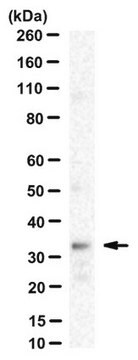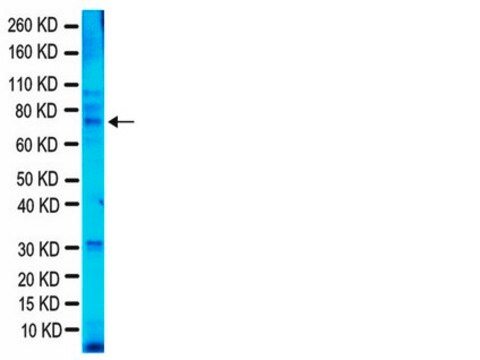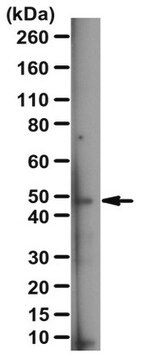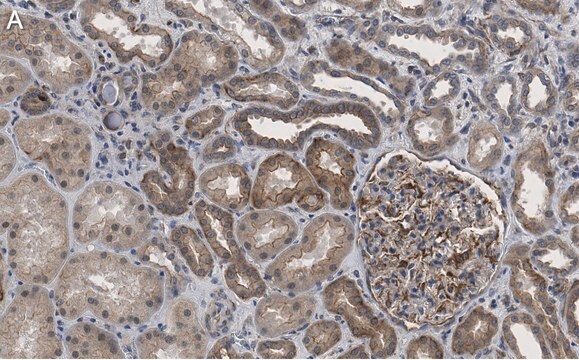ZRB1081
Anti-FMR1 (C-terminal) Antibody, clone 2B16 ZooMAb® Rabbit Monoclonal

recombinant, expressed in HEK 293 cells
Synonim(y):
FMRP, Fragile X mental retardation protein 1, Protein FMR-1, Synaptic functional regulator FMR1
About This Item
Polecane produkty
pochodzenie biologiczne
rabbit
Poziom jakości
rekombinowane
expressed in HEK 293 cells
białko sprzężone
unconjugated
forma przeciwciała
purified antibody
rodzaj przeciwciała
primary antibodies
klon
2B16, recombinant monoclonal
monoclonal
linia produktu
ZooMAb® learn more
Formularz
lyophilized
masa cząsteczkowa
calculated mol wt 71.17 kDa
observed mol wt ~71 kDa
reaktywność gatunkowa
mouse, human
reaktywność gatunkowa (przewidywana na podstawie homologii)
rat, monkey
opakowanie
antibody small pack of 25 μL
charakterystyka ekologicznej alternatywy
Waste Prevention
Designing Safer Chemicals
Design for Energy Efficiency
Learn more about the Principles of Green Chemistry.
rozszerzona walidacja
recombinant expression
Learn more about Antibody Enhanced Validation
sustainability
Greener Alternative Product
metody
affinity binding assay: suitable
immunocytochemistry: suitable
immunohistochemistry: suitable
western blot: suitable
izotyp
IgG
numer dostępu UniProt
kategoria ekologicznej alternatywy
Warunki transportu
ambient
temp. przechowywania
2-8°C
docelowa modyfikacja potranslacyjna
unmodified
informacje o genach
human ... FMR1(2332)
mouse ... Fmr1(14265)
rat ... Fmr1(24948)
rhesus monkey ... Fmr1(700138)
Opis ogólny
Each ZooMAb antibody is manufactured using our proprietary recombinant expression system, purified to homogeneity, and precisely dispensed to produce robust and highly reproducible lot-to-lot consistency. Only top-performing clones are released for use by researchers. Each antibody is validated for high specificity and affinity across multiple applications, including its most commonly used application. ZooMAb antibodies are reliably available and ready to ship when you need them.
Learn more about ZooMAb here.
Specyficzność
Immunogen
Zastosowanie
Immunohistochemistry (Paraffin) Analysis: A 1:1,000 dilution from a representative lot detected FMR1 (C-terminal) in human testis tissue sections.
Immunocytochemistry Analysis: A 1:1,000 dilution from a representative lot detected FMR1 (C-terminal) in HeLa, A431, HUVEC, and NIH 3T3 cells.
Note: Actual optimal working dilutions must be determined by end user as specimens, and experimental conditions may vary with the end user
Opis wartości docelowych
Postać fizyczna
Rekonstytucja
Przechowywanie i stabilność
Informacje prawne
Oświadczenie o zrzeczeniu się odpowiedzialności
Nie możesz znaleźć właściwego produktu?
Wypróbuj nasz Narzędzie selektora produktów.
Kod klasy składowania
11 - Combustible Solids
Klasa zagrożenia wodnego (WGK)
WGK 1
Wybierz jedną z najnowszych wersji:
Certyfikaty analizy (CoA)
Nie widzisz odpowiedniej wersji?
Jeśli potrzebujesz konkretnej wersji, możesz wyszukać konkretny certyfikat według numeru partii lub serii.
Masz już ten produkt?
Dokumenty związane z niedawno zakupionymi produktami zostały zamieszczone w Bibliotece dokumentów.
Nasz zespół naukowców ma doświadczenie we wszystkich obszarach badań, w tym w naukach przyrodniczych, materiałoznawstwie, syntezie chemicznej, chromatografii, analityce i wielu innych dziedzinach.
Skontaktuj się z zespołem ds. pomocy technicznej








